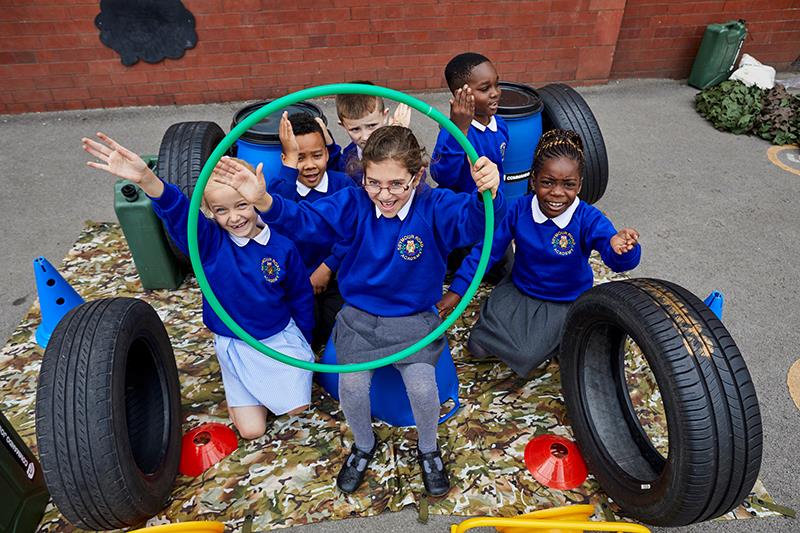In an ever-changing society and with reference to character in Ofsted’s proposed new Education Inspection Framework, in addition to the launch of Damian Hinds’ activity passport, character education has become a hot topic of discussion.
Over the past four years the Wise Owl Trust has overhauled its curriculum to put at its heart the teaching of character. “Learning with character” gives our children the balance of personal and academic achievement. This coupled with the belief that everyone has the potential to excel allows children to thrive and encourages cultural capital.
We believe that character is both “caught” and “taught”. Our values-led approach to education is based on seven core values making the acronym RESPECT: Resilience, Empathy, Self-Respect, Positivity Excellence, Communication and Teamwork.
These character traits are at the very heart of the school and permeate all school activity, including the curriculum. Trust policies embody the seven values, with the whole trust community committed to understanding and modelling these themselves. Common language within the school setting means that children as young as three are being taught the meaning of the values and are supported when applying them within everyday life.
The introduction of our RESPECT curriculum has had a big impact, with the curriculum being driven by positive mental health, good citizenship and future employability. Lessons have been transformed into “missions”, and now no mission is impossible! Resilience is key and is taught to all year groups, as are strategies to self-regulate in the face of adversity. Meanwhile, mistakes are shown to be lessons rather than disappointments.

Mission Mondays
These are the most exciting days for the children, with attendance figures, academic progress, attitudes towards learning, along with pupil voice as our evidence base for this.
On Mission Mondays, the children embark upon the inspirational journeys of explorers such as Ed Stafford, Sir Ranulph Fiennes and many more. Working in teams, the children must use their creativity and problem-solving skills to complete a series of missions, putting their character to the test. Venturing through cargo nets, barrels and a host of other exciting equipment, the children ditch their pens and pencils and put the character traits into practice through collaboration and physical challenges.
Basic maths and English skills are taught throughout the morning sessions then practically applied in the afternoon missions and cross-curricular work. Fractions, ratio and proportion are no longer boring and mind-puzzling, not when you need to apply your knowledge of ratio and proportion to calculate the amount of antidote required to save one of your team-mates after being stung by a deadly spider in the Amazon rainforest!
Learning your spellings is fun and definitely necessary to battle through some of the challenges in order to send signals to others within your team, guiding them to safety.
Missions even spill over into homework, with family members helping children to make Roman shields, mountain ranges, model rainforests, model aeroplanes and much more.
Meanwhile, key stage 1 pupils have an exciting programme of topics written to introduce the RESPECT curriculum to children as young as three. Characters such as Romeo Resilience and Tanisha Teamwork introduce the children to the different values, and take them on range of nursery rhymes, stories and activities to explore the character behaviour traits.
After exploring the crime scene left by the Big Bad Wolf, the children must help the three little pigs to design and build a new, safe home. It is then put to the test. Do the children have the resilience to be put through the test with the ability to self-regulate when facing disappointment? Are the teams able to work together to choose suitable building equipment?
In another mission, the children’s problem-solving skills are tested when they need to work as a team to transport porridge to help the three bears. How will the teams communicate effectively and use their problem-solving skills to choose the correct equipment?
Elsewhere, self-reflection and time to take a few minutes is given throughout the day to discourage episodes of immediate responsive behaviour. Our behaviour policy is integral to the approach, believing in the development of strong relationships and the growing evidence-base that rewards do not work.
Instead our children are congratulated for their development in efforts to make progress in the seven character behaviour traits, establishing greater skills in self-regulation, higher self-esteem and being more resilient in the face of stressful situations.
Our children record their missions and how they felt, along with their own self-reflection of what values they used, within their own personal “passport”. This is a place that the children can not only evidence their own success but also set their own targets using our judgement tool. Parents and staff can also record their child’s progress on the online judgement tool, showing areas for development and next steps.
Within lessons, all topic work is completed in a “Top Secret” mission book. To find their work, you may need to delve within envelopes or work out the answers to questions, or decode a message.

The impact
Pupil voice has shown that this has had a great impact in improving attitudes towards learning and putting learning into context. Previously our pupils struggled to grasp some concepts when they were introduced and then revisited days later due to the huge time constraints on the primary curriculum.
Now, the thematic approach with carefully planned missions, means that the children are immersed in their learning, preventing episodic learning and encouraging previously reluctant writers to pick up a pen. The impact has been huge, with one of our schools recently being awarded “good” by Ofsted for the first time since the school opened more than 20 years ago.
The biggest impact that we have seen is in resilience with the ability to respond positively to set-backs, managing emotions and working with others. Some success stories include a boy diagnosed with ADHD who had been to a local PRU and moved into our academy on a managed move. Days were extremely difficult for him and he spent a huge proportion of his school day in crisis. With the introduction of our new RESPECT curriculum and the focus on understanding our own emotions and strategies to self-regulate, by year 6 he was able to complete his SATs and had a full topic book.
Understanding and believing in the RESPECT culture has been crucial for success with the involvement of the whole-trust community feeding into its development. We have therefore developed our own training programmes for those new to teaching or to the trust, irrespective of role. This gives everyone a shared vision and also ensures everyone feels valued. We have also introduced Character Champions within our schools, and ensure that it features on our governing body agendas to raise the profile and maintain drive within the trust.
The Mission Mondays and curriculum reform has been undertaken in partnership with Commando Joes – a programme that aims to develop pupils’ life-skills and character skills. In each of our academies we have seconded a full-time “Commando” who works with whole classes and groups of children throughout the school day on specific targeted interventions.
The children love to work with the Commandos who bring with them a wealth of leadership skills and provide good role-models. The soft nurturing approach also supports some of the children with the regulation of their own feelings in contrast to the examples maybe shown by others within their lives.
Challenges and next steps
One of our biggest challenges has been resistance against believing that character can be “taught”. However, perseverance and good role models has changed this as the proof is in the pudding. Full curriculum coverage has also been difficult and so some subjects areas or specific objectives are taught discretely or as “mini-missions”.
Once the framework and approach to teaching has been introduced and understood by all, anything can be taught. Only recently the academies have taught online safety through such missions by putting the children in scenarios in order to teach them about the dangers of the internet.
Our next steps are to introduce therapeutic yoga and mindfulness to the children, to arm them with further strategies to use throughout life. We are also developing a pack of resources for parents to help them understand how they can support at home and to help them understand the seven behaviour traits themselves, equipping them with a toolkit to cope with the stresses and strains of life.
- Sophie Murfin is the executive principal of the Wise Owl Trust, a multi-academy trust comprising three primary schools in east Manchester.
Further information & resources
- For more on the RESPECT curriculum at the Wise Owl Trust, visit www.wiseowltrust.com/respect-curriculum/
